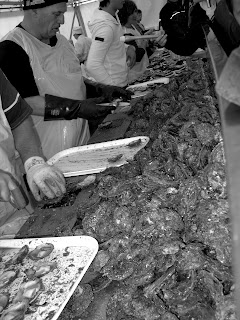Proof, once again, that the 2008 US elections in November are on the mind of every single person living in the free world. Talk about clashing cultures: this billboard was in Invercargill, about 20-km north of a place I like to call the end of the world, a.k.a. the Devil's armpit or, more accurately, Bluff (see previous post).
Tui is the brand name of a New Zealand-made beer. It has a ubiquitous advertising campaign, with billboards that present an unlikely proposition on one side, and the words, "Yeah, right," on the other. There's one near work, by the medical school, which seems particularly apropos to me, and reads, "I'm going to give up pies this semester," to which I can respond emphatically: "Yeah, right."
A tui is also a species of bird indigenous to New Zealand. More on that later ...
Anyway, in case you can't see it clearly, this particular billboard, in the implausible location of Invercargill, Southland, reads: If Hillary wins, Monica gets her job back.
Yeah, right. (ck)
Tui is the brand name of a New Zealand-made beer. It has a ubiquitous advertising campaign, with billboards that present an unlikely proposition on one side, and the words, "Yeah, right," on the other. There's one near work, by the medical school, which seems particularly apropos to me, and reads, "I'm going to give up pies this semester," to which I can respond emphatically: "Yeah, right."
A tui is also a species of bird indigenous to New Zealand. More on that later ...
Anyway, in case you can't see it clearly, this particular billboard, in the implausible location of Invercargill, Southland, reads: If Hillary wins, Monica gets her job back.
Yeah, right. (ck)















